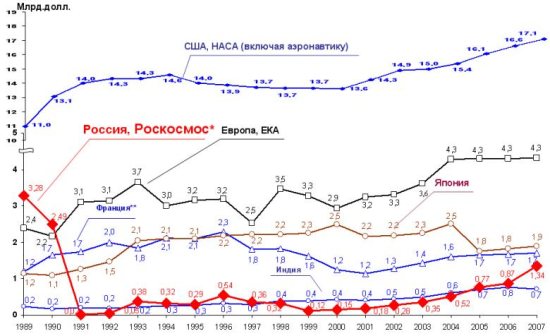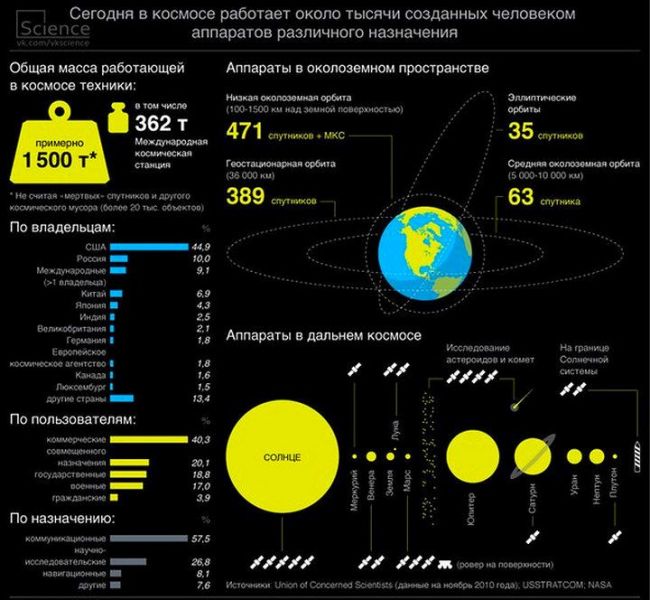-
![[image]](https://www.balancer.ru/cache/sites/i/m/img.lenta.ru/news/2005/12/30/cosmos/128x128-crop/picture.jpg)
Россия поcтавила рекорд по запускам в космос
Теги:
Naib> Вон, спайсы чисто в ремонт погорелой площадки вложили более 50 млн. Лохи, да?
Такая низкая цена как раз потому, что им не пришлось делать землероныне работы и бетонирование, стоимость которых ты пытаешся приуменьшить. В эти 50 миллионов вошло всё оборудование старта, да ещё и демонтаж и утилизация старого. Факир оценил металлоконструкции для LC34 в несколько миллионов, ты пофукал на него. Теперь видишь насколько он был прав, если не строить чудовищную башню как у Ангары?
Такая низкая цена как раз потому, что им не пришлось делать землероныне работы и бетонирование, стоимость которых ты пытаешся приуменьшить. В эти 50 миллионов вошло всё оборудование старта, да ещё и демонтаж и утилизация старого. Факир оценил металлоконструкции для LC34 в несколько миллионов, ты пофукал на него. Теперь видишь насколько он был прав, если не строить чудовищную башню как у Ангары?


Naib>> Вон, спайсы чисто в ремонт погорелой площадки вложили более 50 млн. Лохи, да?
zaitcev> Такая низкая цена как раз потому, что им не пришлось делать землероныне работы и бетонирование, стоимость которых ты пытаешся приуменьшить. В эти 50 миллионов вошло всё оборудование старта, да ещё и демонтаж и утилизация старого. Факир оценил металлоконструкции для LC34 в несколько миллионов, ты пофукал на него. Теперь видишь насколько он был прав, если не строить чудовищную башню как у Ангары?
В отличие от Дема я это как раз понимаю и приуменьшить не пытаюсь. Более того, я немного лучше представляю связность промышленной инфраструктуры, её стоимость и затраты в эксплуатации. Посмотри внимательнее переписку про металлоконструкции LC34.
zaitcev> Такая низкая цена как раз потому, что им не пришлось делать землероныне работы и бетонирование, стоимость которых ты пытаешся приуменьшить. В эти 50 миллионов вошло всё оборудование старта, да ещё и демонтаж и утилизация старого. Факир оценил металлоконструкции для LC34 в несколько миллионов, ты пофукал на него. Теперь видишь насколько он был прав, если не строить чудовищную башню как у Ангары?
В отличие от Дема я это как раз понимаю и приуменьшить не пытаюсь. Более того, я немного лучше представляю связность промышленной инфраструктуры, её стоимость и затраты в эксплуатации. Посмотри внимательнее переписку про металлоконструкции LC34.


Fakir> Оптимизация может отличаться для одноразовой и многоразовой. И даже для одноразовой - оптимизация по ПН и по цене.
Я имел в виду оптимизацию по ПН. Она будет плохая и очень плохая. А оптимизация по цене будет иметь очень сложную зависимость и высокую степень неопределенности
Fakir> Если все блоки одинаковы - ПН проседает (особенно если без перелива, боковухи просто недозаправляются), зато унификация.
Унификация хороша начиная с определенного числа пуском. Причем для одноразовой ракеты ценовый показатели будут монотонно улучшаться с увеличением количества пусков, а для многоразовой могут начать ухудшаться с некоторого числа пусков. И все это плохо прогнозируется на стадии проектных работ. И полной унификации блоков для первой и второй ступеней достичь невозможно, значит и стоимость межполетного обслуживания при переделке блоков первой ступени в блоки второй - возрастут. В общем - практически непредсказуемо.
Я имел в виду оптимизацию по ПН. Она будет плохая и очень плохая. А оптимизация по цене будет иметь очень сложную зависимость и высокую степень неопределенности
Fakir> Если все блоки одинаковы - ПН проседает (особенно если без перелива, боковухи просто недозаправляются), зато унификация.
Унификация хороша начиная с определенного числа пуском. Причем для одноразовой ракеты ценовый показатели будут монотонно улучшаться с увеличением количества пусков, а для многоразовой могут начать ухудшаться с некоторого числа пусков. И все это плохо прогнозируется на стадии проектных работ. И полной унификации блоков для первой и второй ступеней достичь невозможно, значит и стоимость межполетного обслуживания при переделке блоков первой ступени в блоки второй - возрастут. В общем - практически непредсказуемо.


12345> И полной унификации блоков для первой и второй ступеней достичь невозможно, значит и стоимость межполетного обслуживания при переделке блоков первой ступени в блоки второй - возрастут. В общем - практически непредсказуемо.
А тут не забываем что помимо ФХ есть Ф9. Так что нет никакой надобности в переделке блоков, они могут долетать ресурс и сами по себе.
А тут не забываем что помимо ФХ есть Ф9. Так что нет никакой надобности в переделке блоков, они могут долетать ресурс и сами по себе.


Просто для осознания масштабов.
бюджет НАСА 1957-2013
бюджет Роскосмоса 1994-2015
Бюджетные расходы на космос-1992-2015
бюджет Роскосмоса 2000-2014
Финансирования гражд.программ
Сравнение бюджетов НАСА и РК 2001-2012
Бюджеты косм. разных стран 1989-2007

бюджет НАСА 1957-2013
бюджет Роскосмоса 1994-2015
Бюджетные расходы на космос-1992-2015
бюджет Роскосмоса 2000-2014
Финансирования гражд.программ
Сравнение бюджетов НАСА и РК 2001-2012
Бюджеты косм. разных стран 1989-2007

Прикреплённые файлы:


Это сообщение редактировалось 06.03.2018 в 23:00
Fakir>> Просто для осознания масштабов.
Kuznets> Лучше приведи список выполненных миссий, "для осознания масштаба".
Люди рисуют

вот такие картинки "для осознания масштаба":
Kuznets> Лучше приведи список выполненных миссий, "для осознания масштаба".
Люди рисуют

Экономика и финансы день за днем.
Картинка показывает Что, Где и Сколько чего летает в космосе. Космос становится все больше коммерческим и американским. // t.meвот такие картинки "для осознания масштаба":
Прикреплённые файлы:


Еще к вопросу о числе пусков, коммерческом спросе и рекордах.
В 90-х был период бурного роста коммерческого рынка пусковых услуг, и все ждали еще большего, в ожидании по миру начали делать более десятка новых РН.
"...и вышло совершенно наоборот" © М.Булгаков, "Киев-город"
На графике (опубликован не позднее 2009, исходник может быть и от 2006) - фактическое положение дел и прогнозы разных лет.
(итоговый прогноз 2006-2016, кстати, довольно хорошо сошёлся с реальным положением дел)
В 90-х был период бурного роста коммерческого рынка пусковых услуг, и все ждали еще большего, в ожидании по миру начали делать более десятка новых РН.
"...и вышло совершенно наоборот" © М.Булгаков, "Киев-город"
На графике (опубликован не позднее 2009, исходник может быть и от 2006) - фактическое положение дел и прогнозы разных лет.
(итоговый прогноз 2006-2016, кстати, довольно хорошо сошёлся с реальным положением дел)
Прикреплённые файлы:


У "Арианспейса" заказов на 27 "Союзов".

11 сентября 2017

Arianespace announces a new contract, bringing its order book to 53 launches: 17 for Ariane 5, 27 with Soyuz and nine utilizing Vega/Vega C - Arianespace
The opening of World Satellite Business Week 2017 // www.arianespace.com11 сентября 2017
Soyuz: The medium launcher successfully carried out its first-ever two launches into geostationary transfer orbit from the Guiana Space Center, performed on January 27 (Flight VS16) and May 18 (Flight VS17), clearly demonstrating its great flexibility.
Arianespace’s order book now stands at more than €4.7 billion. This corresponds to 53 launches: 17 by Ariane 5, 27 by Soyuz and nine by Vega/Vega C. Of these launches, 60% are for telecommunications satellites, with 40% for Earth observation, navigation and scientific missions. Nearly one-third of these launches will be carried out for European institutions, thereby affirming Arianespace’s mission to ensure autonomous access to space for Europe.


кщееш> Просто табличка.
кщееш> 110 было в год, говорите
К вопросу об этой "замечательной" картинке. И о том, почему ж она, подлюка, именно такова. Гениальный Маск ли нам в том помехой, или падучие "Протоны".
При ITAR, надеюсь, все слышали? Вот то-то и оно-то...
 US bans SES satellite launch by Russia
US bans SES satellite launch by Russia
April 28, 2014
А после удивляются - а чего это в 14-году так упало присутствие России на рынке пусковых услуг?! Маск цены сбил, не иначе, и Протоны падают, на них никто лететь не хочет, ага-ага...
(в скобках замечу, что оба последних факта действительно имеют место быть, но на правах фактиков; роль их далеко не определяющая и вообще не первая)
кщееш> 110 было в год, говорите
К вопросу об этой "замечательной" картинке. И о том, почему ж она, подлюка, именно такова. Гениальный Маск ли нам в том помехой, или падучие "Протоны".
При ITAR, надеюсь, все слышали? Вот то-то и оно-то...

US bans SES satellite launch by Russia
European satellites have fallen foul of tougher US regulations on Russian rocket launches because of the Ukrainian political crisis. Satellites which have been // advanced-television.comApril 28, 2014
European satellites have fallen foul of tougher US regulations on Russian rocket launches because of the Ukrainian political crisis. Satellites which have been built in the US, or have US-supplied components, have long been subject to ‘export’ controls under the USA’s International Traffic in Arms Regulations (ITAR) rules, although those requirements were increasingly seen as being softened over the past few years. The Ukraine-Russia political problems have seen the ITAR rules again toughened.
SES of Luxembourg, London-based Inmarsat and Turksat all have planned launches this year aboard the Russian-supplied Proton rocket system managed by Russian-owned International Launch Services (ILS).
SES had planned to launch Astra 2G this summer on an ILS/Proton rocket from the Russian launch site in Kazakhstan. Inmarsat has two launches booked with ILS, while Turksat 4B is also slated for launch this summer on a Proton vehicle. Astra 2G was built by Astrium of France, but uses key US-made components.
Last week (on April 24th) a maritime satellite built by a Canadian company for Ontario-based ComDev was banned from having a June launch from Kazakhstan. ComDev says it has other launch options.
SES and the other satellite operators could switch launch contractors to either France’s Arianespace or California-based SpaceX but both launch specialists have a long waiting list of customers.
If the US political sanctions continue to bite then Europe’s satellite operators could be severely impacted given the pressure on non-Russian rocket launches. As one well-placed industry source suggested on April 27th: “Generally speaking: if Proton is not available for a prolonged period, the satellite industry has a problem…”
А после удивляются - а чего это в 14-году так упало присутствие России на рынке пусковых услуг?! Маск цены сбил, не иначе, и Протоны падают, на них никто лететь не хочет, ага-ага...

(в скобках замечу, что оба последних факта действительно имеют место быть, но на правах фактиков; роль их далеко не определяющая и вообще не первая)


Fakir> К вопросу об этой "замечательной" картинке. И о том, почему ж она, подлюка, именно такова. Гениальный Маск ли нам в том помехой, или падучие "Протоны".
Fakir> http://files.balancer.ru/.../04-5566701-03-12-02-755097096390136.png
Я тут немного добавил по результатам 2017-го. Китай что-то неожиданно просел. В этом году, правда, они должны наверстать.
Fakir> http://files.balancer.ru/.../04-5566701-03-12-02-755097096390136.png
Я тут немного добавил по результатам 2017-го. Китай что-то неожиданно просел. В этом году, правда, они должны наверстать.
Прикреплённые файлы:


zaitcev>> Я тут немного добавил по результатам 2017-го. Китай что-то неожиданно просел.
Fakir> А что тут неожиданного? С Китаем ИМХО неожиданно скорее то, что он вообще на этом рынке сумел присутствовать после того, как его Штаты в 2000 фактически полностью выкинули.
Китайцы делают спутники и продают полные комплекты другим странам вроде Боливии. Примерно как Ангосат, только у них работает. Плюс это не только коммерческие пуски. У них ДЗЗ колом прёт. И всякие демонстраторы тоже... Конечно, Иридиум пускаьт им не дадут, но у них есть рынок.
Fakir> А что тут неожиданного? С Китаем ИМХО неожиданно скорее то, что он вообще на этом рынке сумел присутствовать после того, как его Штаты в 2000 фактически полностью выкинули.
Китайцы делают спутники и продают полные комплекты другим странам вроде Боливии. Примерно как Ангосат, только у них работает. Плюс это не только коммерческие пуски. У них ДЗЗ колом прёт. И всякие демонстраторы тоже... Конечно, Иридиум пускаьт им не дадут, но у них есть рынок.


- Последние действия над темой
- dmirg78 [10.02.2018 09:03]: Перенос сообщений из Дайджест от февраля 2018г
- Все действия над темой
Copyright © Balancer 1997..2021
Создано 31.12.2005
Связь с владельцами и администрацией сайта: anonisimov@gmail.com, rwasp1957@yandex.ru и admin@balancer.ru.
Создано 31.12.2005
Связь с владельцами и администрацией сайта: anonisimov@gmail.com, rwasp1957@yandex.ru и admin@balancer.ru.
 zaitcev
zaitcev

 инфо
инфо инструменты
инструменты Naib
Naib
 12345
12345

 Fakir
Fakir











 Alexandrc
Alexandrc





